#Apothegms
Text
Quotes
Life is a reason to live and a passion to feel.
Fiction is an enigma of the self.
Art is the mirror of nature.
The dead become memories of experience.
Music is the painting of words.
Figures of speech have to be experienced as art.
Listen to your inner soul.
My self surrenders to passion.
God’s footsteps are path for light to follow.
Desire is the source to pleasure.
Make dreams a working reality.
In ecstasy and orgasm the self-partakes a mystic joy.
Love the self as it’s a soft soul.
A merry self lacks no joy.
When the world puts you down rise up with optimism.
Make figures of speech an active life.
The self is an opulent ornament.
When an opportunity comes grab it with outstretched hands.
A rainbow is a painting made by God as a covenant of peace.
Carry no demons of envy, malice and covetousness.
Wit is seasonal flesh.
God gives more than you ask.
The etiquette of happiness is contentment.
Let loose your passion.
God’s morals are a conscience of reason
Find time to exercise passions.
Liberty has to thrive with freedom.
Take a risk and see what you get.
Wisdom is the folly of the lover.
Wisdom is the path to philosophy.
Finance gratifies the body.
Nietzsche is a wounded soul.
Walking on water is spiritual acrobatics.
Demons are spirits that antagonize the self.
Torment in hell is more than you can imagine.
Man’s search for beauty never ends.
Existence is the essence of meaning.
Life is the flow of a river.
We can take refuge and help in God.
Socrates was a wise philosopher who knew nothing.
I want God to make my footstool earth a prosperous dwelling place.
Lust is an ecstatic sin.
I have done fornication on the bed of poetry and I feel truly repentant.
2 notes
·
View notes
Text
Potato Crisps / Chips on Tasting History
So we've just watched Max's latest...
youtube
...and I was grinning a bit because I posted about Dr Kitchiner's 1817 (non-US, definitely non-Saratoga) crisps / chips recipe a month ago.
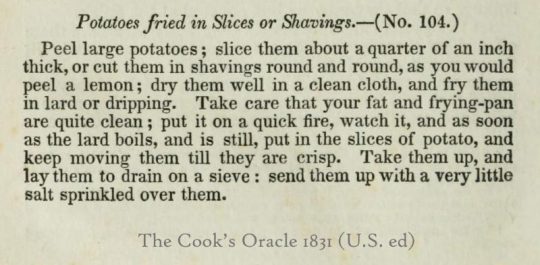
That image was from an American edition of his book; I've found a pic from the original - NB that these slices are floured before frying.
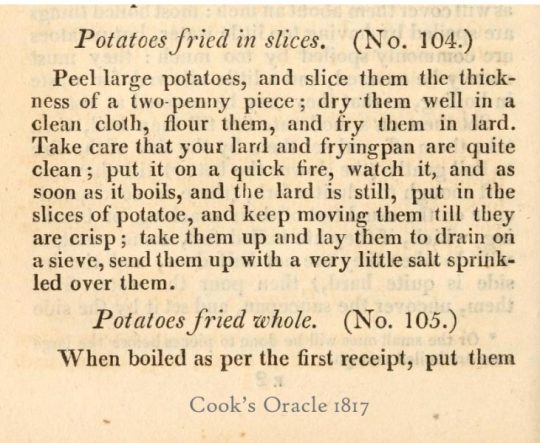
For reference, here's a two-penny piece from about 1797; the coin would still be current 20 years later:


...and here's how thick the potatoes should be sliced. That's 4mm, which is 2mm less than "a quarter of an inch" (6.25mm).
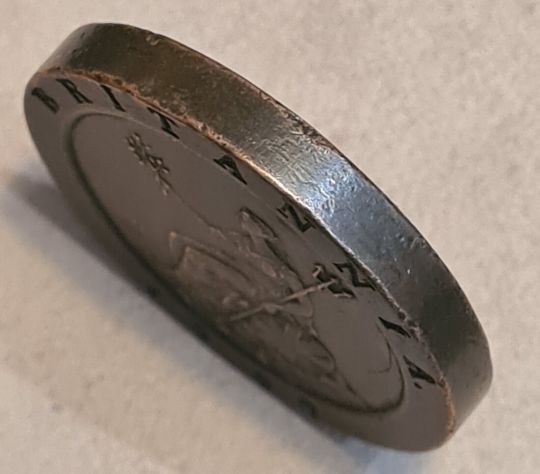
The slices will get even thinner as their moisture evaporates during frying, and, given the nature of recipes, potatoes cooked this way are probably even older than 1817 and Kitchiner's is just the first appearance found so far in print.
*****
The first recipe for "Game Chips" (an accompaniment to grouse, pheasant etc.) appeared, per the Wikipedia link, in a 1903 book published by famous chef Auguste Escoffier (1846-1935):

"Chip potatoes - these are potatoes cut into thin slices; this is usually done with a special plane. (A mandoline.)
They are put in cold water for 10 minutes; then drained, dried in a cloth and fried until very crunchy. They are served hot or cold and generally accompany game roasted in the English style."
However, per Escoffier's Wikipedia page, much of his work was based on that of Anton Carême (1783-1833), whose dates are squarely coincident with Dr Kitchiner's Potato Slices.
Given the amount of cookery to-and-fro between England and France after the Napoleonic wars were over, it's impossible to say who first came up with the idea of potato crisps.
The French loved dainties - "un petit quelquechose", a little something - which the English pronounced and dismissed as "kickshaws", something over-fussy yet insubstantial. Yet those same English also loved roasting things with their appropriate accompaniments.
(I'm writing this just over a week after Christmas, and have been well reminded that the phrase "Roast (turkey / goose / beef) With All The Trimmings" is still in common 21st-century use.)
If those roasted things were game birds, only those above a certain level in society would be eating them, so it's not unreasonable to assume a rich-person game bird would attract fussy, time-consuming rich-person trimmings like, okay, Game Chips.
One thing's for sure, Potato Crisps - and Game Chips too, so hard luck, Escoffier - are almost certainly older than even Tasting History could prove.
*****
BTW, they also existed at a time when "English Food Was Bland" is more fake history.
Sauces put out on the table in fancy bottles had fancy labels ("bottle tickets") showing what was in them, and the contents were often far from bland.
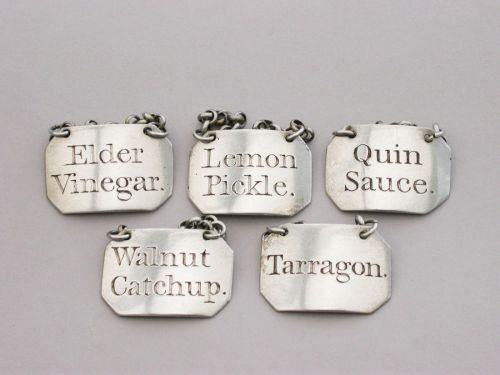
Quin sauce was anchovy-based, hot and pungent.

Harvey's was a spicy sauce similar to Worcestershire, ketchup was probably mushroom and also spicy; the other two need no elaboration.

AFAIK the two crescent-shaped ones in the next pics are deliberate imitations of an officer's rank-gorget.



Finally a generic Not-Bland label that would go on any number of modern bottles (antique silver, yours for £250)...
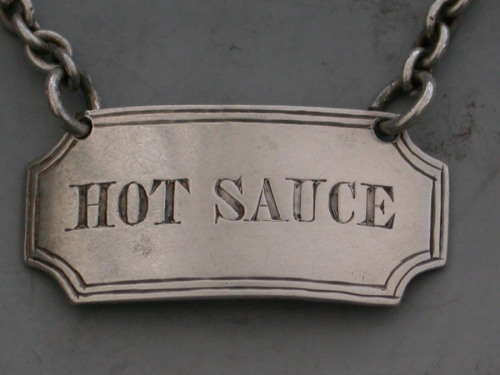
*****
And after all of the above, I could do Very Bad Things to a packet of Tayto Cheese 'n' Onion. A packet?
Why stop at a packet when A Pack takes less time to say?

After all, It Is Written that:
"Reading One Book Is Like Eating One Potato Crisp Chip."
And also that Nothing Exceeds Like Excess...
#food and drink#potato crisps#game chips#Tasting History with Max Miller#Diane Duane#Reading one book is like...#...like eating one potato chip#wise words maxims and apothegms#Youtube
605 notes
·
View notes
Text
“Nunca é tarde para começar, sempre é cedo para desistir. Nada é impossível e intransponível pela idade, senão pela vontade e pelas disposições que se faz e se permite ter.” — A Musa Solitária.
3 notes
·
View notes
Text
Have ah inadvertently said some evil thing?
Yosemite Sam
0 notes
Text
JADE: it’s a doggy dog world out there
ROSE: Did you just say-
JADE: …dalmatians and corgis and dachshunds all excitedly wagging their tails and…
ROSE: That’s not how that apothegm-
JADE: …how does one even carry that many treats..
ROSE: It’s about the fickle cruelty of man. About the ease with which others are sacrificed if doing so means staying afloat in these stygian waters-
JADE: … and i can’t wait to leave the island and see bec play with other dogs and-
ROSE: Oh.
JADE: haha sorry i think i was talking over you. what did you say? :)
ROSE: Nothing of consequence. Yes, it is a doggy dog world out here. I hope you get to see it someday.
118 notes
·
View notes
Text
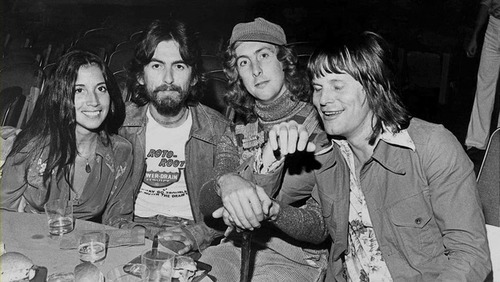
Photo by Jim Selby, © Mirrorpix.
“Terry Gilliam (another and inexplicable love at first sight) was with me the night in May 1975 when we attended the first screening of Monty Python and the Holy Grail at the old Directors Guild building on Sunset. I think I knew George was supposed to be coming, and was slightly anxious and even unsure about meeting him, as I had heard what a raving fan he was, but I was blown away when he appeared at the end in the darkened cinema, and hugged me and launched straight into the first of many intense conversations, which began as monologues and then, as I grew confident and emboldened to interrupt and share my thoughts, became long and deep conversations about everything in our universe: life, death, love, the nature of religion; hours of sharing and ‘catching up’ as he called it, as if he too felt he’d known me before, and his apothegms and memories and jives and rants enlivened my life for almost thirty years. We had retired to the projection room to smoke a jay and were finally kicked out of there and went off to A&M Studios […]. We then went on to the Beverly Wilshire Hotel, where I was staying, and talked and talked and talked, oh my God how he could talk. This was the quiet one! He never shut up. Thank God.” - Eric Idle, The Greedy Bastard Diary (x)
#George Harrison#Eric Idle#Terry Giliam#Olivia Harrison#quote#quotes about George#George and Eric Idle#George and Olivia#George and Terry Gilliam#George and Monty Python#1975#1970s#fits queue like a glove
93 notes
·
View notes
Text












Staff Pick of the Week
We hold several editions of emblem books from the 16th though 18th centuries, including several early editions of Emblemata by Andrea Alciati, the progenitor of all printed emblem books. It was quite by accident that I encountered this little emblem book, Idea de un Principe Politico Christiano Representada en Cien Empresas (Idea of a Christian Political Prince Represented in 100 Maxims) by the Spanish diplomat and essayist Diego de Saavedra Fajardo (1584-1648), published in Amsterdam by the noted map and atlas publisher Jan Janszoon (1588-1664) in 1664.
I was quite taken by the 103 emblematic copperplate engravings illustrating the book's 101 (not 100) anti-Machiavellian essays on the education of a young prince intended for the son of Philip IV of Spain. The first edition was published in Munich by Nicolao Enrico in 1640, and was subsequently published in several editions (including this one) and translated into several languages. It is often thought that the first edition was published in Monaco, as it appears on the title page, but the Latin name for Munich is Monacum.
The choice of the emblematic form by Saavedra follows the example of Erasmus that, in order to teach the maxims to the prince, one must "present them to the memory intently, at times with a sentence, at times with a simile, at times with an example, at times with an apothegm, at times with a proverb." I am charmed by all the engravings, but I think my favorites are the beehive with the epithet Nullipatet (Null and Void) and the last image with the epithet Ludibria Mortis (Games of Death).



View more posts with Emblem Books.
View other Staff Picks.
– MAX, Head, Special Collections
#Staff Pick of the Week#emblem books#emblems#engravings#copperplate engravings#Diego de Saavedra Fajardo#Idea de un Principe Politico Christiano#Jan Janszoon#Jan Jansson#Johannes Janssonius#political advice#political education#education for a prince
51 notes
·
View notes
Text



These were heavily inspired by Apothegm by AlchemyPhoenix on Ao3
It’s cracked, go read it
275 notes
·
View notes
Text
After considering and rejecting all the usual biological or morphological criteria, Du Bois concluded that a black person is most accurately “someone who must ride Jim Crow in Georgia.” My son, Touré (who insists that I note for the public record that he is not the guy who writes about hip-hop in the Voice), suggests a variation of Du Bois’s formulation that holds for the post-Jim Crow era: you are what the police think you are.
Those apothegms go to the heart of the matter. “Race” is purely a social construction; it has no core reality outside a specific social and historical context. That is not to say that it doesn’t exist or that it is therefore meaningless, but its material force derives from state power, not some ahistorical “nature” or any sort of primordial group affinities—the nineteenth-century racist mush that has never lost its appeal as a simpleminded journalistic frame. Racial difference is not merely reflected in enforced patterns of social relations; it emerges exclusively from them.
Class Notes -- Adolph Reed
20 notes
·
View notes
Note
Any thoughts on Spinoza?
love a monist
few years ago i read most of delueze's book on spinoza which i thought was good at the time, might revisit
Atheist in the Attic is a really good book, and although brief, maybe the most vivid portrait of him ive gotten
david graeber, talking about his book bullshit jobs, offhandedly described part of his framework- centering care/caregiving, freedom, and play rather than terms like production and consumption- as his "spinozan feminist" intervention. he talks about "the Spinozan vitalist tradition, which you could say ultimately sees desire as freedom and play, the expression of life’s full capacities for their own sake" which is probably the most valuable single part of spinoza's influence and legacy for me. apparently he was one of graeber's favorite philosophers, but he doesnt seem to cite him much.
harold bloom's The Book of J is one of my all-time favorite books, and certainly seems to evoke the spirit of spinoza. J's Yahweh surely must be closely tied to spinoza's god, and is maybe the only true link between his disposition and kafka's. in bloom's Jesus and Yahweh, he says
"Baruch Spinoza’s magnificent admonition has haunted me for more than half a century: “It is necessary that we learn to love God without ever expecting that he will love us in return.” Ethically, that has a certain poignance, but is it humanly acceptable? If you substitute Hamlet for God in Spinoza’s observation, then I might understand it far better than I do. The popular Christian definition “God is love” fades away in the aura of Spinoza’s inspired “intoxication,” to use Coleridge’s characterization of the great Jewish moralist as a “God-intoxicated man.” If my reader is God-intoxicated, then she wisely will smile benignly enough at my qualms, but was Spinoza not talking about Yahweh and not Jesus Christ’s God the Father? Spinoza’s family, Iberian Marranos, had returned to Judaism in tolerant Amsterdam, where the synagogue, doubtless motivated by nervousness in regard to its Calvinist hosts, reluctantly excommunicated its best mind for his supposed “pantheism,” in which Yahweh and his creation would not always be distinguished.
It makes little sense to say “Yahweh is love,” or that we must love Yahweh. He just is not, never was, and never will be love. Many, if not most, of us at one time or another fall in love with someone who neither can accept love nor return it, though she or he perhaps demands it anyway, if only as worship or tribute. Until I Chronicles, Yahweh sets the pattern for such destructive role-playings, best exemplified in Shakespeare by Cleopatra—until Act V, when she apparently is transformed in the wake of Antony’s death. Even there, Shakespeare endows her with an equivocal quality that is an endless challenge to actresses: how do you play the part of someone who no longer knows whether or not she is playing herself? When Yahweh, perhaps in love with David, as he may have been with Joseph, David’s precursor, promises that he will be a father to Solomon, can we interpret the promise as other than divine dramatism?
...An unrequited love can be an imaginative benefit to poets, but not to most of us. Spinoza, though cast out by his fellow Jews in Amsterdam, was intoxicated with Yahweh rather than with the Christian God the Father. Love and the fear of Yahweh are one; I cannot recall the New Testament speaking of the fear of God the Father. The Yahwist's God did not create out of love, though his motive was to make a human in his own image. Moses (Deuteronomy 6:5) commands the Hebrews to love God with all their heart, soul, and might but he does not say the love will be reciprocated..."
and in Ruin the Sacred Truths: "The Jewish God is a personality and a subjectivity, and only if He is indeed dead is the death of the subject more than a currently fashionable Gallic trope. We can cite Spinoza's wholly Jewish apothegm: "Wisdom is meditation not on death but on life." Spinoza might have quoted the fundamental Jewish admonition of the rabbi Tarphon, in Pirke Abot: "You are not required to complete the work, but neither are you free to desist from it." The work cannot be completed in time, yet we must work as if there will be time enough to complete it, "to give time to time," as in a Sephardic proverb."
also these all look interesting:
https://tinyurl.com/2w4t54k3
https://repository.ubn.ru.nl/handle/2066/162321
https://www.nytimes.com/2006/06/18/books/review/18bloom.html
7 notes
·
View notes
Text
Quote on Miracle
A miracle is God’s (Christ’s) favor received with a blessing.
0 notes
Text
In another apothegm, Christ himself says to a monk: "'But I tell you: much toil is needed, and without toil, no one can have God,' for he himself was crucified for us."
We have a hard time with such remarks, which promise us struggle and toil. One might think that the monks won't allow us to live, that all they see is harshness and renunciation. But in the final analysis behind the insistence on asceticism lies a positive image of humanity. The monks believe that we can do work on ourselves. We aren't completely at the mercy of our predispositions or our past upbringing. The monks don't try to find excuses for themselves in an education gone wrong; they don't put the blame for their lives on other people. They take personal responsibility for their lives and shape them in the light of that responsibility. They don't feel helplessly abandoned to their desires. Instead, they trust the power that God has given us, a power by which we can liberate ourselves from the obstacles that might hold us back from life.
Heaven Begins Within You: Wisdom of the Desert Fathers by Anselm Gruen. Chapter Four: Asceticism, pg. 45-46.
#asceticism#faith#christianity#monasticism#heaven begins within you#anselm gruen#k reads#journal#spiritual journey
2 notes
·
View notes
Text
“Quando eu era criança, não sabia o mundo que eu era, mas queria conquistar tudo que há. Agora que cresci, não quero desbravar tudo que há, e sim desbravar e conquistar a mim.” — A Musa Solitária.
3 notes
·
View notes
Text
Transliterators are cowards, apothegm should have been apophthegm, think of how many more people would look at the latter word in utter despair, why did you take that away from us.
8 notes
·
View notes
Text
"research"
the term originated between 1890 and 1895 as a calque from the French phrase tranche de vie, credited to the French playwright Jean Jullien (1854–1919).[2]
Jullien introduced the term not long after a staging of his play The Serenade, as noted by Wayne S. Turney in his essay "Notes on Naturalism in the Theatre":
The Serenade was introduced by the Théâtre Libre in 1887. It is a prime example of rosserie, that is, plays dealing with corrupt, morally bankrupt characters who seem to be respectable, "smiling, smiling, damned villains..." Jullien gave us the famous apothegm defining naturalism in his The Living Theatre (1892): "A play is a slice of life put onstage with art." He goes on to say that "...our purpose is not to create laughter, but thought." He felt that the story of a play does not end with the curtain, which is "only an arbitrary interruption of the action which leaves the spectator free to speculate about what goes on beyond your expectation..."[3]
In literary parlance, the term "slice of life" refers to a storytelling technique that presents a seemingly arbitrary sample of a character's life, which often lacks a coherent plot, conflict, or ending.[8] The story may have little plot progress and often has no exposition, conflict, or dénouement, but rather has an open ending. A work that focuses on a minute and faithful reproduction of some bit of reality, without selection, organization, or judgment, and where every small detail is presented with scientific fidelity, is an example of the "slice of life" novel.[9]
...
In slice-of-life fiction, the story focuses on a short episode in a character’s life, usually incorporating mundane aspects of their daily routine as a way to discuss the character’s interior world. It doesn’t generally emphasize plot development - or it at least always plays second fiddle to character development - Slice-of-life graphic novels have this way of always feeling cozy (????); even when characters are dealing with tough topics, those topics are human-sized and usually catalyze growth and resilience.
...
Slice of life, such as: episode of actual experience, faithful rendering, graphic account, lifelikeness, naturalistic description, and photographic realism.
...
The appeal of slice of life is that it allows you to take in a lot of different things without having to form an opinion about them.
You can just let stuff happen without worrying about how it means anything or what it means for your character’s story arc.
In some ways, slice of life can be more relaxing than other genres because it doesn’t require you to think about what you’re watching or try to analyze it at all. (what kind of take is this???)
The stories typically do not focus on events that occur during the course of the day, but rather on small interactions between the characters. These interactions may include conversation or other forms of communication, such as phone calls and text messages.
...
What is slice of life? It is a storytelling genre defined by the tone, scope, and subject matter it chooses to focus on.
...
so that leaves us with chapters of slice of life, contrary to popular opinion, slice of life is not a type of artistic medium like comics and tv series. it is what i think of as a derailment of a plot. (hm.) in most works a plot derails a slice of life. so slice-of-life is extremely dependent on your stories pace, your writing technique, your POV and most of all the capability of having more than one plot or a sub-plot.
...
I, for one, do not want to read a novel like that. I want it to make sense, to have a purpose, for the character to face whatever odds to resolve her internal issues as she meets her main challenge and either masters it or dies trying. I am giving up a piece of my life to expereince the story--make it worth my while.
...
A story has to go somewhere. There has to be a purpose. Just making up characters and having them 'do things' isn't a story. You're throwing away your characters because you don't know what to do with them. There's a method to plotting.
...
don't understand this question, but I will try to answer. First, you ask: Is there such a thing as a "slice of life" novel. I would say yes. The books that come to mind are Laura Ingalls Wilder's "Little House On The Prairie" books, because they don't really have a plot so much as they just tell what day-to-day life was like when she was growing up. - Don't be a snob and dismiss these books as being for children. I was in my 40s before I read them, and I realized how wrong I'd been. Though they can certainly be enjoyed by children, they are extremely enjoyable for adults as well.
Next you ask: Is it weird to create characters and put them in various situations? I have no idea. If it serves the story, of course. If you're just trying to add to your page count, no.
I think you might be concerned about having a thin plot. Padding it with pointless characters is not going to help. Some books are plot-driven, some are character-driven. Some are more of a meditation on a theme. There are many "right" ways to tell a story. Don't be didactic. Maybe your book doesn't need a complicated plot.
...
Do what you feel like doing. Better still, do what you'd like to read. If it's weird, that may be a good sign.
...
1 note
·
View note
Text
rating answers to "why is there something rather than nothing"
Sidney Morgenbesser answered the question with an apothegm: "If there were nothing you'd still be complaining!"
huh. haven't heard that one before. apothegm is kind of a gross word though like why are you coughing rather than noughing. 7/10
Frank Wilczek is credited with the aphorism that "nothing is unstable"
funny. plausible. not very explanatory for the mechanics at hand but i'm awarding extra points for conciseness. 8/10
Max Tegmark wrote about the mathematical universe hypothesis, which states that all mathematical structures exist physically, and the physical universe is one of these structures
boooo tegmark aside from being tautological, anthropocentric, and purposely designed to insist upon the primacy of pure math for its own sake, this is both unnecessarily convoluted and shockingly unimaginative. why would everything exist just because something does. this does not logically follow, you have to accept it axiomatically. WEAK! why would there be more somethings with nothing than somethings with something. BOOORING. what if there are universes where math operates differently. THAT'S an interesting question but it's also INOBSERVABLE! ε/10
different equations or mathematical structures (level 4)
oh. my bad. sorry. it's just convoluted, not unimaginative. π/10
Leibniz attributed to God as being the necessary sufficient reason for everything
abolutely not. 0/10
Roy Sorensen writes that to many philosophers the question is intrinsically impossible to answer, like squaring a circle, and even God does not sufficiently answer it
THANK you sorensen i was DREADING having to explain this to liebniz. 6/10 for steez even though that's the wrong answer
Heidegger called it "the fundamental question of metaphysics"
factually accurate but that's not really an answer 4/10
Carroll concludes, as did Russell, that "any attempt to account for the existence of something rather than nothing must ultimately bottom
sean carroll and bertrand russell real as fuck for this!! 10/10
5 notes
·
View notes